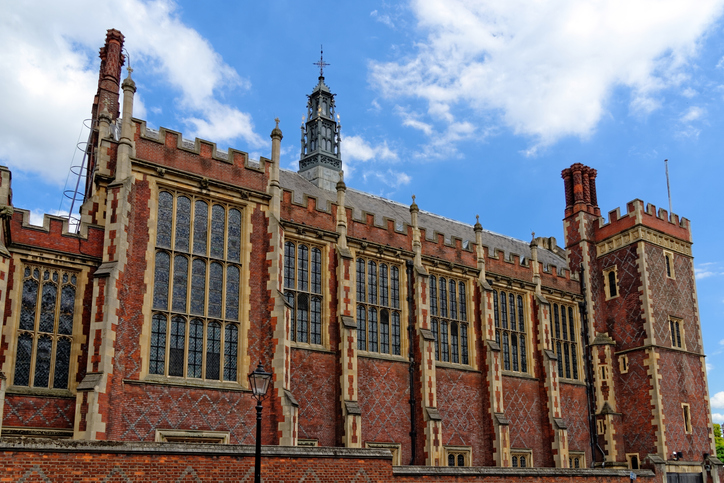The story of the out-of-touch 1960s High Court judge asking counsel ‘Who are the Beatles? Are they giving evidence in this case?’ is almost certainly apocryphal, as is the suave response (‘I believe they are a popular beat combo, m’lud.’). But a majority decision from the Benchers of Lincoln’s Inn this week shows that senior lawyers can still manage the remarkable feat of being at the same time both super-hip and blithely unaware of much going on around them.
From its founding in the turbulent late fourteenth century the Inn has started all formal meals with a grace, the present version being: ‘Lord God, Heavenly Father, bless us and these Thy gifts which we receive from Thy bountiful goodness, through Jesus Christ, our Lord. Amen.’ On Tuesday, however, it abandoned this: from now on there will be a bland recitation of thanks for the food and company, of a kind not out of place at the annual dinner of a coarse fishing club or a society of dental technicians.
Why? The Treasurer, a sharp if sometimes opinionated judge, was clearly not at his best when cornered by the press. Asked to comment, he descended into mechanical cliché: ‘It is a priority to continue to enhance the relevance of the Inn to all our members, and build an increasingly inclusive environment. This will involve taking the time to correct outdated stereotypes.’ The Under-Treasurer, the organisation’s chief executive, added some corporate-speak of her own. Members, she said, ‘felt uncomfortable’. The Inn needed to avoid anything ‘explicitly Christian’ because of its ‘diverse range of members with a different range of beliefs’.
What is interesting is that the members of a society of top lawyers did not point out that, quite apart from amounting to a truculent trashing of tradition, none of this actually makes much sense.
For one thing, top lawyers are meant to be tough arguers, not shrinking violets. Whatever they may say in their answers to hastily-completed questionnaires, the idea that substantial numbers of them suffer serious discomfort at the sound of words they disagree with is both odd and pretty implausible: for that matter, if true, it would seem to show something worryingly wrong with the legal profession. Besides, if Lincoln’s Inn wishes to be truly inclusive, what about those lawyers, say from an African or Caribbean background, who might feel disconcerted at the imposition of a corporate policy of aggressive godlessness (which is what an explicit expunging of any reference to Christianity amounts to)?
Secondly, one wonders who the Benchers are trying to impress here. Aspiring lawyers and students? What they want and need is advice and help in how to get on in an incredibly insecure and demanding profession – something which, to be fair, the Inn absolutely excels at providing. Questions of the theology of the grace said before meals comes, one suspects, pretty low on a student’s list of priorities: indeed, if it does not, that might even suggest that the student could have chosen the wrong profession.
Clients? An excellent barrister is marked by the ability to hold a client’s hand, explain his case and fight his corner like a terrier. Neither his client nor his solicitor, it is safe to say, gives a fig for the details of the procedure at the Inn dinner which counsel may go on to afterwards.
There seems to lie a facile assumption that anything Christian is regarded as offensive to non-Christians
The public? The idea that there is a surge of public disquiet in Dover and Doncaster at Lincoln’s Inn’s use of a Christian grace is preposterous. On the other hand, the reaction of an ordinary person on a middle-class housing estate to hearing about its abandonment is likely to be a disappointment at the loss of tradition and a feeling that lawyers’ leaders should have something better to do than engaging in self-righteous virtue-signalling.
Thirdly, behind this there seems to lie a facile assumption that anything Christian is regarded as offensive to non-Christians. This again is dangerous nonsense. More importantly it is a slur on the good nature and tolerance of the British people.
Unfortunately, this looks more like a reflection of a process we know all too well. Wokery and easy-listening leftish culture have become an upper-middle-class fad and a corporate obsession. Lawyers are not immune to this. A couple of years ago someone told a very successful set of barristers’ chambers that Lord Hardwicke, the early eighteenth-century Lord Chancellor it was named after, had once advised that Caribbean slave-owners retained their rights in slaves they brought to England. Its members reacted rather like the scandalised bystanders that characterise numerous Bateman cartoons. The old name disappeared into a memory-hole: the chambers was in indecent haste rechristened Gatehouse, a new name which somehow, we were assured, ‘accords with who we are as an organisation.’.
I greatly admire Lincoln’s Inn and the barristers who comprise it. (Declaration of interest: I am a member.) For once, however, it seems to have allowed itself to be beguiled by fashionable foolishness. The best thing it can do in future for its members and the legal profession is steer clear of this kind of faddishness and obsession with the opinion of the great and the good, and instead go back to promoting the kind of forceful common sense we used to associate with English Bar.






Comments